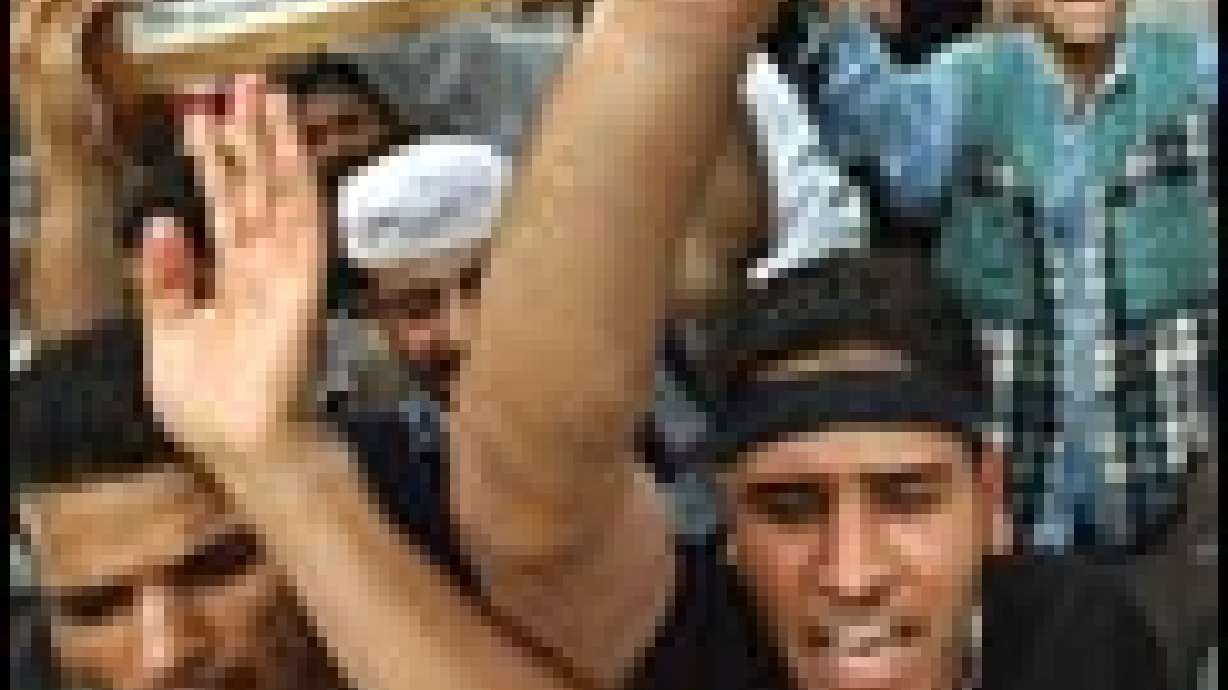Estimated read time: 5-6 minutes
This archived news story is available only for your personal, non-commercial use. Information in the story may be outdated or superseded by additional information. Reading or replaying the story in its archived form does not constitute a republication of the story.
BASRA, Iraq (AP) -- Tens of thousands of Shiite Muslims shouting "No to America!" marched Thursday through this southern city to back their spiritual leader's call for early elections, a stand that could stymie a U.S. blueprint for transferring power to a new Iraqi administration.
The peaceful demonstration in Basra, Iraq's second-largest city, followed a string of violent incidents across the country, including a car bombing in Baqouba and a series of clashes between U.S. troops and insurgents that left 20 people dead.
An estimated 20,000-30,000 Shiite Muslims turned out to support Grand Ayatollah Ali al-Husseini al-Sistani's demand that an interim legislature be elected directly and not chosen in provincial caucuses, as called for under the American plan.
The massive demonstration for the most powerful cleric of Iraq's majority Shiites showed that the United States cannot afford to take al-Sistani's criticism of the transfer plans lightly.
Smaller demonstrations also took place Thursday in Baghdad, Ramadi and Mosul, of a few hundred people each, cautioning against aspects of the U.S. plan for Iraq's future, which they fear will divide the country.
Under the current plan, the United States will transfer power by July 1 to a provisional Iraqi government to be created by a legislature chosen by provincial caucuses. The plan envisions a two-year political transition before full elections in 2005.
U.S. officials say al-Sistani's demand for elections to choose members of the assembly are unreasonable because a credible election could not be conducted on such short notice due to the country's precarious security situation.
Iraqi leaders and U.S. authorities hope a meeting in New York on Monday with U.N. Secretary-General Kofi Annan will help resolve the impasse over al-Sistani's objections.
Annan has written to the Governing Council, saying that holding a credible election before June 30 may be impossible. Shiite council members dismissed that as the view of "faraway" experts unfamiliar with the realities of Iraq. Many Iraqis would like the United Nations to play a major role in the transfer of power.
"If the agreement is implemented under the supervision of the Americans alone or the coalition as a whole, it will be deficient because it will have been carried out under occupation," said Mahmoud Othman, a Kurdish Governing Council member.
"But if it's implemented under the supervision of the United Nations, the Europeans and the Arab League, then it will be much more acceptable."
The question of legitimacy has dogged Iraqi politics since the downfall of Saddam Hussein's regime in April. The Governing Council is viewed by many Iraqis as a tool of U.S. administrator Paul Bremer, who hand-picked its 25 members in July. Many council members are Saddam critics who spent many years outside Iraq before returning home.
At a news conference Thursday in Baghdad, the current president of the Governing Council, Adnan Pachachi, said he believes al-Sistani can be convinced that elections cannot be held right away.
But even if al-Sistani relented on immediate elections, "he wants to see a better way of electing the legislature, better than the one proposed in (the) Nov. 15 agreement," said Pachachi, who met al-Sistani last week and is in frequent contact with him through intermediaries.
"We agreed that there is room for improvement, there are many many ideas to make it more transparent and inclusive ... whereby the Iraqi people, in a very obvious way, can manifest their desires," Pachachi said.
The Basra protesters shouted "No, no to America! Yes, yes to al-Sistani!" as they marched through the streets under the close watch of British soldiers before dispersing.
"We are here to support Sistani's edict to avoid an appointed council laying down our constitution. If that happens we will resist," said Osama Mohammad, a 32-year-old unemployed man.
Troops found and defused a roadside bomb made up of 155 mm artillery shells, said British army Maj. Mike Elviss.
The car bombing occurred Wednesday morning in the central town of Baqouba when a motorist tried to drive into the walled compound of a police station in the city 40 miles northeast of Baghdad.
Police Col. Salam Omar said guards opened fire after the driver ignored orders to stop. The driver then detonated the vehicle, killing himself and two others and wounding about 30 people, including police, Iraqi civil defense officers and civilian bystanders.
Also Wednesday, U.S. soldiers killed four attackers in a firefight in Abu Kharma in central Iraq during one of the 28 raids they conducted that netted 31 insurgents, said Master Sgt. Robert Cargie.
In Khalas, also in central Iraq, a U.S. Amy patrol fired at two Iraqis digging a hole, apparently to plant bombs, killing them both Wednesday, Cargie said.
U.S. soldiers returned fire at two people who attacked them with automatic weapons, killing one and injuring the other, Cargie said. He said they were planting a homemade bomb.
Elsewhere, two foreign civilian drivers were killed Wednesday during an attack near Tikrit on a convoy operated by U.S. contractor Kellogg, Brown & Root, said military spokeswoman Maj. Josslyn Aberle.
On Tuesday, six cars driving past a U.S. patrol in Samarra began shooting at the soldiers, who returned fire, killing eight Iraqis, Aberle said.
In a raid early Wednesday in Samarra, 70 miles north of Baghdad, American troops arrested four nephews of Izzat Ibrahim al-Douri, a former right-hand man of Saddam.
Also Thursday, bank notes bearing Saddam's portrait became obsolete as a three-month period to exchange them for the new dinar ended. More than 10,000 tons of worthless notes are being destroyed, said a joint statement by the Central Bank of Iraq and the Coalition Provisional Authority.
(Copyright 2004 by The Associated Press. All Rights Reserved.)









